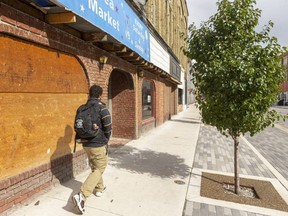Push for tax on vacant homes continues despite mayor's disdain

Article content
Mayor Ed Holder blasted the idea of penalties to target vacant homes as housing prices in London skyrocket and supply plummets, slamming calls for a tax as an expensive layer of “bureaucracy.”
Pitched as a possible option to help boost supply amid the city’s growing housing crisis, Holder refused to support further study of a tax – or even a vacant homes strategy – saying it won’t solve homelessness or deter land speculators.
He was overruled, in a 4-2 vote at the corporate services meeting that recommended hiring a consultant to investigate strategies to tackle homes sitting empty, including, but not limited to, a tax.
“Taxing (owners) just to try to change behaviours, I’m struggling with that . . . we don’t need this much bureaucracy to deal with demolition by neglect,” Holder said, asking what problem a vacancy tax would solve.
“If (politicians believe), magically, the owners of vacant properties are now going to turn these into affordable housing units, then, with deep respect, we are not at all on the same page,” he added later, calling the proposal a waste of money.
Holder and Ward 6 Coun. Mariam Hamou voted against the proposal, and councillors Maureen Cassidy, John Fyfe-Millar, Shawn Lewis and deputy mayor Josh Morgan supported looking further into the feasibility and the benefits of tackling empty homes. Their recommendation goes to council in February.
City staff suggest the cost to implement such a tax – pegged at $2.1 million a year – would outweigh the revenues, estimated at around $2 million annually, not including any startup costs.
There are just 62 known vacant residential buildings, according to a new registry started last year by city hall after council tightened its bylaws. Owners of vacant buildings – across all property classes – have been hit with 180 fines after monetary penalties were approved by council. However, that list is based on vacancies that pose a safety risk, mostly driven by public complaints.
Several politicians took aim at the numbers.
“I believe it’s drastically more than that. They look good, so they’re not on our demolition request list, we’re not getting the bylaw calls,” Ward 12 Coun. Elizabeth Peloza, who pushed to investigate a vacancy tax last year, said of vacant homes.
Taxing owners who let their units sit empty will boost neighbourhood “vibrancy, eyes on the street, creating those networks we want of people who live here and have a vested interest in our community,” she said.
Using an estimate of 0.5 per cent vacancy among residential properties, London would have many more empty homes, roughly 780.
City staff looked at other cities using or mulling a vacancy tax, including Vancouver’s example, where the “empty homes tax” was slapped on property owners starting in 2017. It led to about a 22 per cent drop in vacancies and generated more than $30 million in revenue to funnel into affordable housing projects.
Two advocates for low-income Londoners also wrote to politicians urging them to consider a vacancy tax.
“We believe that the tax will bring much-needed affordable residential units back into the market and discourage real estate speculation,” wrote Neighbourhood Legal Services lawyer Mike Laliberte and LifeSpin director Jacqueline Thompson.
Affordable housing is getting harder to find, and market rents are rising, the pair warned.
“Many private investors are purchasing affordable housing units, renovating them, and then requesting higher rents. We are seeing a number of affordable rental townhouse complexes being bought by companies and then placed on the market to be sold to owners who then displace tenants. We are also aware of properties being purchased by developers and holding companies and left vacant for many years,” they wrote.
LifeSpin has warned city council repeatedly about the risk of dilapidated and vacant buildings that are leading to unsafe living conditions for those who seek shelter there. Several have gone up in flames.
London’s red-hot real estate market continued to the end of 2021, with the average sale price of a home in the London-area market – including Strathroy, St. Thomas and parts of Middlesex and Elgin counties – hitting a record $707,000 in December.
That’s up nearly 28 per cent from a year ago.
Out-of-town buyers and new Londoners helped drive demand. Homes sales eclipsed 10,000 last year for only the second time on record. Inventory plunged to just 175 active listings last month, an historic low to end the year.
“I could drive you out to two (homes) today, they have been sitting vacant for months. No one is living in them. Every so often, a company comes by to cut the grass or plow the snow. That’s a place somebody could call home,” Lewis, who chairs the committee, said.
“We do have a massive (housing) problem,” he added later.
Postmedia is committed to maintaining a lively but civil forum for discussion. Please keep comments relevant and respectful. Comments may take up to an hour to appear on the site. You will receive an email if there is a reply to your comment, an update to a thread you follow or if a user you follow comments. Visit our Community Guidelines for more information.